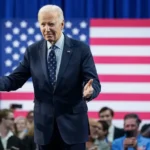
Published November 2, 2023
Many Democrats have long wanted to put former president Donald Trump in jail. His recent behavior suggests he thinks it will help him politically if he gets there sooner rather than later.
That’s what could happen if he continues to make comments in public and on social media regarding the multiple cases filed against him. Prosecutors and defendants are typically restricted with respect to what they can say publicly before and during a trial. That prevents them from tainting the jury pool with information or views that may not be admissible at trial. In some cases, it can also prevent efforts to tamper with a witness’s testimony by offering veiled threats or promises.
Trump, as we all know, is anything but a typical defendant. He is not only a former president whose criminal indictments in many cases arise out of things he said or did while in office; he is also a declared candidate for president who is lapping the GOP field. The cases are clearly an issue in the campaign, and as a result would normally be the subject of political speech. Preventing him from speaking to counter allegations opponents make or offer his own characterizations of the charges runs the risk of improperly preventing legitimate political speech protected by the First Amendment.
Trump, however, is atypical in another way that is all too familiar. He does not seem to consider himself bound by normal rules of propriety or custom. Indeed, much of his appeal as a businessman and a politician stems precisely from his brash, “I beat the elites at their own game” persona. That propensity to dial everything up to eleven attracts attention, for good and ill, and has throughout his career.
Put those qualities and considerations together, as we have in the cases against Trump, and we get a potentially toxic brew. Trump, for reasons good and bad, seems unable to keep himself from issuing characteristically bombastic and shrill comments about his cases. That puts him in direct opposition to the law, which forbids that type of behavior.
That’s why Trump is now subject to two so-called gag orders issued by judges hearing his cases, orders which limit what he can say in respect to certain aspects of the trials and are intended to prevent him from engaging in the type of improper behavior that can result in miscarriages of justice.
Finding the right balance between protecting his legitimate political speech and the court’s legitimate interest in presiding over a fair trial was always going to be difficult. It may be that the scope of these orders is overbroad. But the normal approach to such a possibility is to challenge the order in court. While Trump’s lawyers are pursuing that avenue, Trump himself seems to be more interested in flagrantly flouting the judges’ instructions.
He’s already been fined twice by the judge overseeing his New York civil trial for speaking or commenting on social media in violation of the gag order in that case. The real question is going to be to what lengths that judge or federal district-court judge Tanya Chutkan will go to muzzle Trump’s penchant for bluster.
A trial-court judge typically has wide latitude to levy penalties to compel obedience to such an order. They can be as light as admonishing the defendant or as serious as jailing him or her. Defendants normally do not want to antagonize the judge who is in charge of making crucial rulings on motions and evidentiary admissibility. Trump, however, seems to be more concerned about the court of public opinion.
Trump’s steady rise in GOP polls this year is coincident with the increasing legal peril he faces. Some had thought multiple indictments would sink him with Republican voters. Instead, the cases seem to have rallied them to his banner. Many seem to agree with him that he is the victim of a politicized justice system and see every blow struck against him as a badge of honor.
If this is the case, a man like Trump could rationally conclude that provoking the judges helps his reelection chances more than it hurts him in court. That is likely to be especially true with respect to Judge Chutkan, who is an Obama appointee who has already taken a tough line in sentencing January 6 defendants and hence is easier to paint as a partisan in judicial robes. Imagine what the outcry from his team would be if Judge Chutkan confined him to Mar-a-Lago or even appointed an overseer of his social-media accounts to enforce her order.
The idea of a former president maneuvering himself into being disciplined by the court, or perhaps even jailed, for political advantage would have been laughably fantastic just a decade ago. In today’s Trump-dominated fun-house version of politics, it is depressingly likely.
Henry Olsen, a senior fellow at the Ethics and Public Policy Center, studies and provides commentary on American politics. His work focuses on how America’s political order is being upended by populist challenges, from the left and the right. He also studies populism’s impact in other democracies in the developed world.











